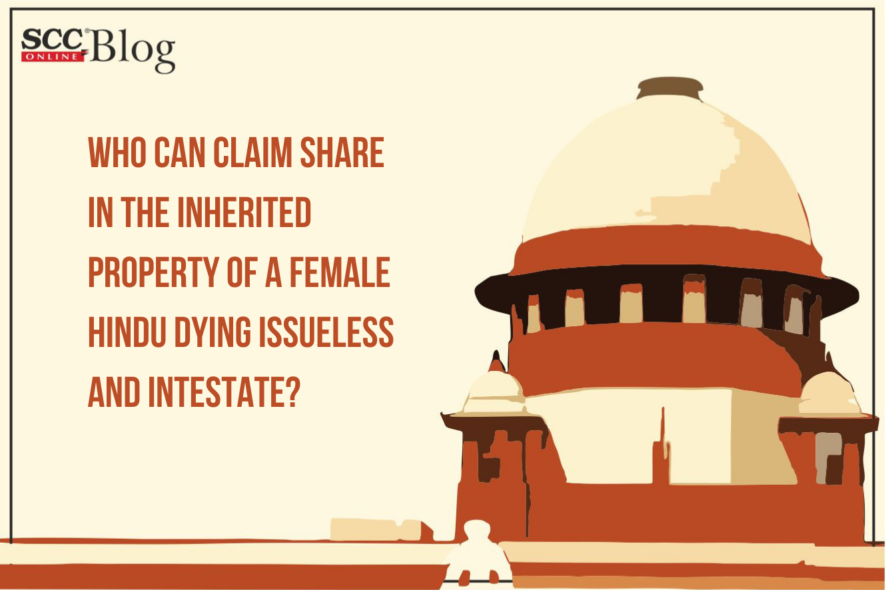Supreme Court: The bench of SA Nazeer and Krishna Murari*, JJ has held that if a female Hindu dies intestate without leaving any issue, then the property inherited by her from her father or mother would go to the heirs of her father whereas the property inherited from her husband or father-in-law would go to the heirs of the husband. However, if she dies leaving behind her husband or any issue, then Section 15(1)(a) of the Hindu Succession Act, 1956 comes into operation and the properties left behind including the properties which she inherited from her parents would devolve simultaneously upon her husband and her issues as provided in Section 15(1)(a) of the Act.
Scheme of the Hindu Succession Act, 1956 and the relevant provisions
The main scheme of the Act is to establish complete equality between male and female with regard to property rights and the rights of the female were declared absolute, completely abolishing all notions of a limited estate. The Act brought about changes in the law of succession among Hindus and gave rights which were till then unknown in relation to women’s property. The Act lays down a uniform and comprehensive system of inheritance and applies, inter-alia, to persons governed by the Mitakshara and Dayabhaga Schools and also to those governed previously by the Murumakkattayam, Aliyasantana and Nambudri Laws. The Act applies to every person, who is a Hindu by religion in any of its forms including a Virashaiva, a Lingayat or a follower of the Brahmo Pararthana or Arya Samaj and even to any person who is Buddhist, Jain or Sikh by religion excepting one who is Muslim, Christian, Parsi or Jew or Sikh by religion.
Section 15 lays down the general rules of succession in the case of female Hindus. The scheme of sub-Section (1) of Section 15 goes to show that property of Hindu females dying intestate is to devolve on her own heirs, the list whereof is enumerated in Clauses (a) to (e) of Section 15 (1). Sub-Section (2) of Section 15 carves out exceptions only with regard to property acquired through inheritance and further, the exception is confined to the property inherited by a Hindu female either from her father or mother, or from her husband, or from her father-in-law. The exceptions carved out by sub-Section (2) shall operate only in the event of the Hindu female dies without leaving any direct heirs, i.e., her son or daughter or children of the pre-deceased son or daughter.
The basic aim of the legislature in enacting Section 15(2) is to ensure that inherited property of a female Hindu dying issueless and intestate, goes back to the source.
Thus, if a female Hindu dies intestate without leaving any issue, then the property inherited by her from her father or mother would go to the heirs of her father whereas the property inherited from her husband or father-in-law would go to the heirs of the husband. In case, a female Hindu dies leaving behind her husband or any issue, then Section 15(1)(a) comes into operation and the properties left behind including the properties which she inherited from her parents would devolve simultaneously upon her husband and her issues as provided in Section 15(1)(a) of the Act.
Section 15(1)(d) provides that failing all heirs of the female specified in Entries (a)-(c), but not until then, all her property howsoever acquired will devolve upon the heirs of the father. The devolution upon the heirs of the father shall be in the same order and according to the same rules as would have applied if the property had belonged to the father and he had died intestate in respect thereof immediately after her death.
Applicability of the law on the case at hand
Suit for partition was filed by Thangammal, daughter of one Ramasamy Gounder, claiming 1/5th share in the suit property. The said Ramasamy Gounder had an elder brother by the name of Marappa Gounder. Ramasamy Gounder, predeceased his brother Marappa Gounder who died on 14.04.1957 leaving behind the sole daughter by the name of Kuppayee Ammal who also died issueless in 1967. Further case set up by the plaintiff/appellant was that after the death of Marappa Gounder, his property was inherited by Kuppayee Ammal and upon her death in 1967, all the five children of Ramasamy Gounder are heirs in equal of Kuppayee and entitled to 1/5th share each.
Noticeably Kupayee Ammal, after inheriting the suit property upon the death of Marappa Gounder, died after enforcement of Hindu Succession Act, 1956, which has amended and codified the Hindu Law relating to intestate succession among Hindus.
Since the property in question was admittedly the self-acquired property of Marappa Gounder despite the family being in state of jointness upon his death intestate, his sole surviving daughter Kupayee Ammal, will inherit the same by inheritance and the property shall not devolve by survivorship.
Further, since the succession of the suit properties opened in 1967 upon death of Kupayee Ammal, the 1956 Act shall apply and thereby Ramasamy Gounder’s daughter’s being Class-I heirs of their father too shall also be heirs and entitled to 1/5th Share in each of the suit properties.
[Arunachala Gounder v. Ponnusamy, 2022 SCC OnLine SC 72, decided on 20.01.2022]
*Judgment by: Justice Krishna Murari
Counsels
For appellant: Advocate P.V. Yogeswaran
For respondent: Advocate K.K. Mani








Thank you for explaining the complexities around the inheritance rights of a female Hindu dying issueless and intestate. This article provides much-needed clarity on a topic that can be confusing for many. It’s an excellent resource for both legal professionals and individuals dealing with such matters.
A valuable resource on family law topics! Your comprehensive coverage of various issues provides essential insights for navigating complex family legal matters.